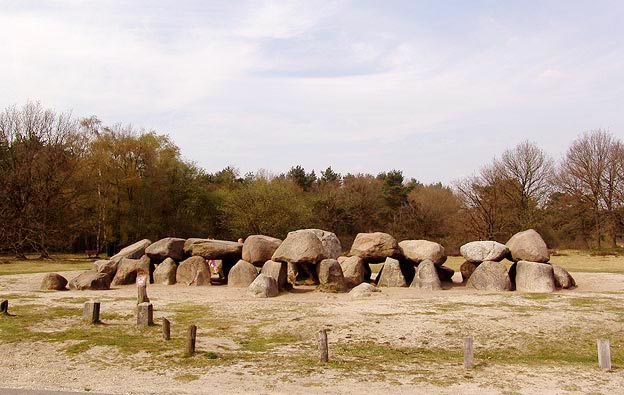


| Everyone has heard of Stonehenge in England and
dolmens and menhirs in France. But who knows of even older and more numerous
megalithes in The Netherlands..? Even most of the Dutch themselves are unaware
of the richness of the prehistoric monuments in their own country. But
they exist..!,and they are there for over 5000 years. Older than the Egyptian
pyramids! Built of huge granite stones, some of them weighing over 25,000
kilograms, dragged to the spot and piled up to form a rectangular stonegrave.
Unbelievable, but true.
There are still 54 of them. 52 in the province of Drenthe and 2 in the adjacent province of Groningen. "Hunebedden" as they are called in this country. But not built by Hunen (or huynen = giants) and not beds but graves as we know now. So Drenthe, in the northern part of the country, is the hunebedden-province. It's a province of outstanding beauty with sanddunes, woods, moors, heather, picturesque villages, 200 years old farmhouses with thatched roofs. And mysterious stonegraves..! In Drenthe there are no mountains or rocks. But
hunebedden are made of huge stones. Where did they come from..? The
answer is: from Scandinavia. About 200,000 years ago, during an ice-period,
most of northern Europe including our country was covered by a thick layer of
ice. The big boulders of which the hunebedden are made of have been transported
to The Netherlands by slow moving ice-glaciers. Even
today, digging in Drenthe's soil, smaller and bigger stones emerge.
So there is no mystery after all..? Yes there is. The big question remains unanswered. Why did these simple farmers make such a tremendous effort to drag those heavy boulders to a construction site and pile them up to making a huge stonegrave? And how on earth did they do this..? There are several theories but even today it would be a hell of a job..! A feeling of great astonishment and admiration remains. N.B. To be exact, hunebedden in Holland are "Passage Graves" rather than dolmens, Dolmens are in fact smaller and have no passage stones for an entrance. |